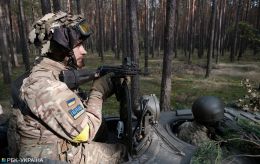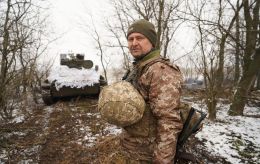Beginning of Ice Age: Scholz-Macron rift and implications for Ukraine
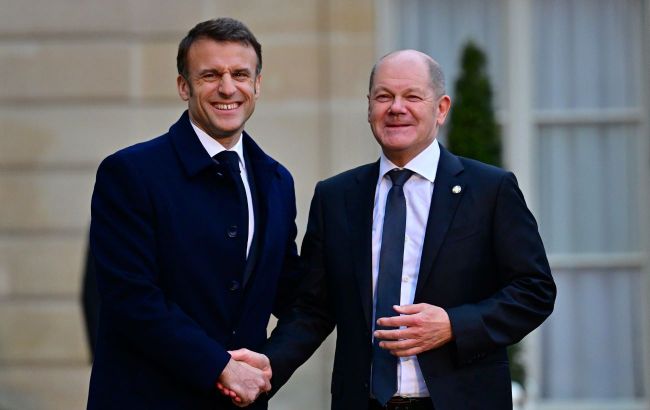 Emmanuel Macron and Olaf Scholz made the Western press nervous (Photo: Getty Images)
Emmanuel Macron and Olaf Scholz made the Western press nervous (Photo: Getty Images)
The February summit of European leaders in Paris and the statement about the possible deployment of troops to Ukraine have stirred up the Western press. Many wrote about the quarrel between French President Emmanuel Macron and German Chancellor Olaf Scholz, which supposedly could escalate into open hostility.
What happened, why Macron resorts to political trolling, whether there is indeed a conflict with Scholz, and what it means for Ukraine is analyzed in the material by RBС-Ukraine.
Sources used in preparing the material include coverages from Politico, Bloomberg, Bild, Süddeutsche Zeitung, FAZ, Die Welt, statements by French President Emmanuel Macron and German Chancellor Olaf Scholz, and comments from political analyst Volodymyr Fesenko.
Content:
- Macron, Scholz, and Ukraine: What really happened
- No quarrels, no enmity. Why Macron trolls Scholz and what it has to do with Ukraine
- Not only Ukraine. A long history of disagreements on many fronts
- Debate is in full swing, but will there be consequences for Ukraine
Macron, Scholz, and Ukraine: What really happened
A photo of Macron and Scholz shaking hands warmly on the steps of the Elysee Palace shouldn't deceive anyone. Their recent quarrel rather signals the beginning of a "dangerous Ice Age," as noted by the daily Bild and echoed throughout the German press.
"Europe's main engine? For decades, the standard response of any European diplomat has been the Franco-German engine. It rarely works like clockwork. But rarely has it been mishandled as badly as today," details the tabloid.
The talk revolves around differences regarding the Ukrainian issue, including the potential deployment of ground troops, mentioned by Macron and categorically rejected by Scholz. Amid the shortage of ammunition in Ukraine, the French and German leaders diverge in their opinions on military assistance. Berlin's policy from the outset of Russia's full-scale invasion has been guided by the principle of avoiding direct confrontation with Moscow at any cost. However, after the informal summit in Paris on February 26, Macron discarded German caution.
"We will do everything possible to ensure that Russia cannot win this war," he said, without ruling out the deployment of Western troops to Ukraine.
No quarrels, no enmity. Why Macron trolls Scholz and what it has to do with Ukraine.Photo: Emmanuel Macron believes that the question of sending Western troops to Ukraine should not be ruled out (Getty Images)
Most NATO leaders distanced themselves from Macron, emphasizing that there are no plans to send troops. Scholz also dismissed any assumptions about this, stating that there would be no European or NATO ground forces in Ukraine.
"Olaf Scholz's words are often spoken belatedly and in whispers. What's even more impressive is the boldness with which the chancellor assured that under no circumstances will German soldiers be sent to Ukraine," noted Süddeutsche Zeitung.
Recently, Macron clarified: regarding the dispatch of troops, "nothing can be ruled out." However, this merely marks the beginning of a discussion on assistance to Ukraine on its territory, rather than Paris seriously considering such a possibility. In his view, the moment is approaching when it is "necessary not to be cowards," and partners need to step up. German Defense Minister Boris Pistorius labeled the statement counterproductive and unhelpful in addressing the issue of aid to Ukraine. Later, the French president clarified that he didn't specifically mean Berlin, but merely wanted to "shake up" allies.
No quarrels, no enmity. Why Macron trolls Scholz and what it has to do with Ukraine
Differences between Scholz and Macron are escalating into something akin to open hostility, writes Politico. German officials complain about the readiness of the French leader to speak harshly about Ukraine, while the support from his country cannot be compared to that of Germany.
According to the Kiel Institute, France, with its €640 million, lags behind Germany, which has provided or promised assistance worth €17.7 billion. Therefore, Scholz seizes any opportunity to press Paris to deliver more weapons and ammunition.
The French government claims to have spent €3.8 billion, and officials say they provide genuinely needed weapons and do so with less hesitation than the Germans. They cite the reluctance of Scholz to supply the Taurus missile as an illustrative example. Conversely, the French approved the SCALP back in July. While these are functional equivalents, the German missile is believed to have a more suitable warhead for targets like the Crimean Bridge.
"The issue is that Macron’s position is weakened by the limited amount of military aid France has provided Ukraine so far, which isn’t on par with its profile as Europe’s strongest military power," Bloomberg quotes Rym Momtaz, a Paris-based researcher for the International Institute for Strategic Studies.
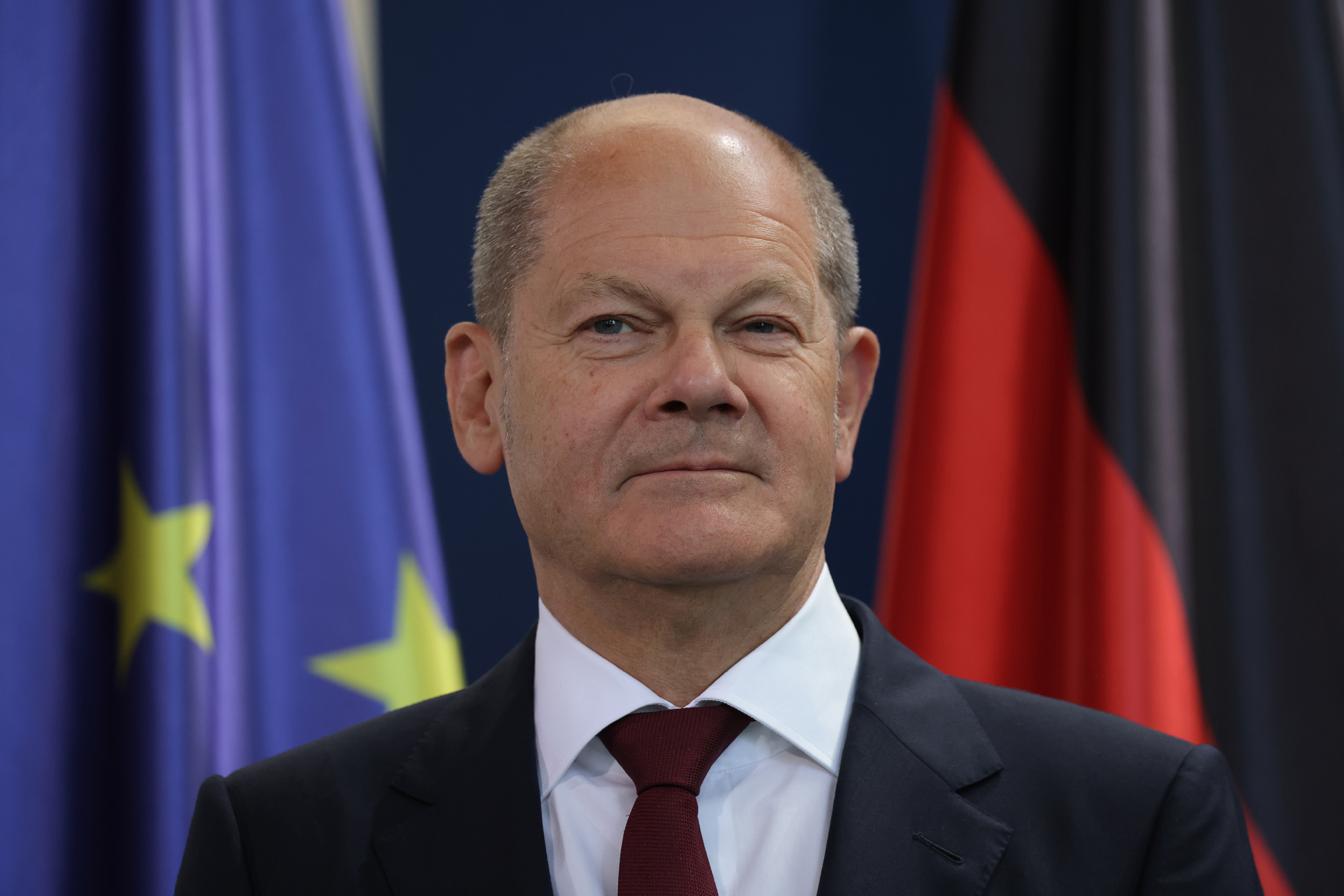 Photo: Olaf Scholz is trying to pressure European allies to increase the supply of weapons and ammunition to Ukraine (Getty Images)
Photo: Olaf Scholz is trying to pressure European allies to increase the supply of weapons and ammunition to Ukraine (Getty Images)
Ukraine requests Taurus missiles due to a shortage of ammunition. In February, partially due to the armament shortages, the Defense Forces were forced to leave Avdiivka, bringing Russia its most significant success in months. Taurus missiles are needed to target Russian depots and logistics deep behind the front lines. However, Scholz claims that the deliveries would supposedly require the deployment of military specialists to program the missiles. And after the leaks of Luftwaffe officers' discussions, another argument against it emerged - the need for control to prevent Ukraine from striking Russian territory.
More on this and why the leakage of German officers' talks likely delays the prospect of receiving Taurus, read in a separate material by RBC-Ukraine.
Political scientist Volodymyr Fesenko emphasizes that there is no quarrel, conflict, or split between Scholz and Macron. If there were, the chancellor would hardly have attended the summit. There has been competition and long-standing contradictions between them since Scholz took office in Germany in 2021.
"And there is also trolling. The statement about 'cowardice' is blatant trolling and, in my opinion, not appropriate, although many of us liked it. You can criticize Scholz for his caution regarding Taurus, but for fairness, Germany has provided Ukraine with several times more military aid than France," he tells RBC-Ukraine.
As for Ukraine, there are no principled contradictions here. Macron uses the aid issue to present himself as the new European Churchill and distinguish himself from the chancellor.
"The idea of sending troops is good, but the problem is that the President of France understood perfectly well what the response would be. Not only from Scholz's side, but even the Poles were against it, not to mention the USA. Another big question is whether we gained more positive or harm. It's good that the discussion has started, but it should have been started in other forms to preserve unity and not provoke a massive 'no'. I would say it's Macron's political game," he adds.
Not only Ukraine. A long history of disagreements on many fronts
There's a long history of disagreements between Macron and Scholz.
"This is just the latest issue in Franco-German relations. France and Germany argue over projects for combat aircraft and tanks, and mutually block arms supplies at the European level. And all this at a time when the future of NATO solidarity in terms of security policy is being questioned more sharply than ever by Donald Trump (the favorite of the Republicans in the US presidential race - Ed.)", Die Welt notes.
More details on his recent remarks can be found in the material "Ran into criticism. How Trump's statements prompting Europe to reconsider U.S. leadership in NATO".
What is clear is how the difference in approaches manifests. According to one French official, Macron sees Scholz as a leader without courage or ambition, who does not think beyond the short-term perspective. Bloomberg, citing unnamed sources, writes that there was a "lack of chemistry" between them from day one. Berlin sees a monarchic figure who talks more about grand ideas than actually implementing them.
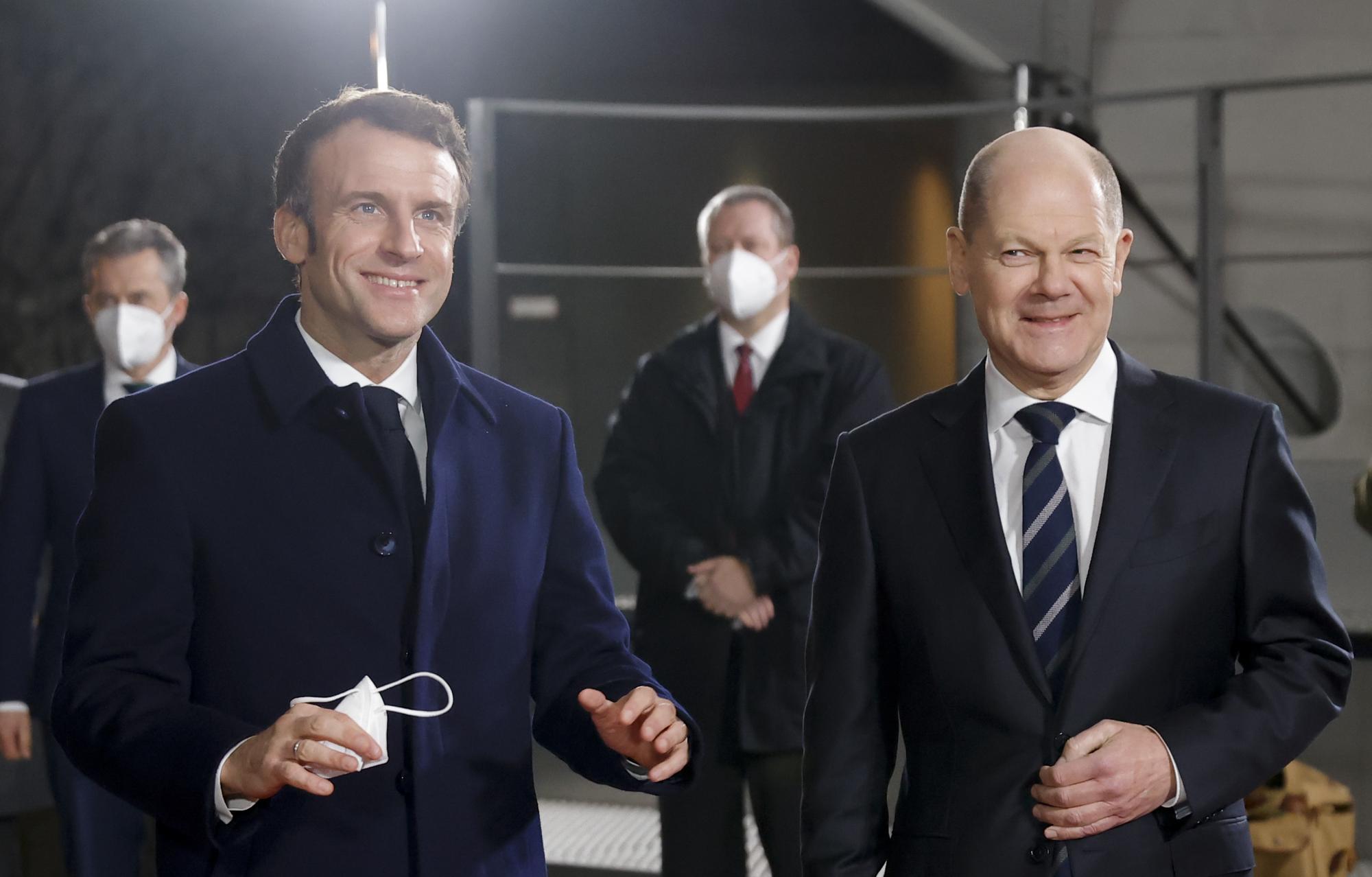 Photo: Macron and Scholz have a long history of disagreements even without Ukraine (Getty Images)
Photo: Macron and Scholz have a long history of disagreements even without Ukraine (Getty Images)
On the other hand, the difference in internal contexts should be taken into account. The French president will remain in office until the end of his second term in 2027. While his German counterpart is trying hard to maintain a three-party coalition against the backdrop of high ratings for the right-wing Alternative for Germany, whose opposition to arms supplies to Ukraine finds some support among voters.
One point is worth mentioning - the change in the economic situation since 2018, when France's growth rates began to outstrip German ones. Paris' prospects look relatively rosy after the energy crisis that hit Berlin and led to a downturn in 2023 due to the rejection of cheap Russian resources.
Scholz and Macron know each other well. According to one Bloomberg source, the turning point in relations was in 2018 when the then Finance Minister and Vice Chancellor proposed that France give up its seat on the UN Security Council in favor of the EU. Stern, hesitant, but almost always true to his word, Scholz is oriented towards the US. While Macron, flexible and inclined to grand gestures, promotes European strengthening.
As Bild writes, sharp conflicts of interest have intensified for several reasons:
- Community debts. France insists on issuing joint euro bonds with Germany bearing the main responsibility. The federal government is categorically against it.
- Farmer protests. Under pressure from the streets, France has blocked the EU free trade agreement with South American countries, negotiations on which have been going on for almost 20 years. Germany says the agreement is of great macroeconomic and strategic importance to it.
- Energy policy. Berlin and Paris argue over the role of nuclear energy in replacing fossil fuels. They also disagree on whether hydrogen produced using nuclear energy contributes to the energy transition.
There is also personal competition in their relationship. Macron seeks to become the European leader that Angela Merkel once was.
"Scholz doesn't want anything special, he demonstrates caution. In this case, we saw differences in political styles. There's the German one - not to rush and act cautiously. And there's the French one - bright, loud statements, which often don't lead to action. And the Germans talk less and act more," explains Fesenko.
Debate is in full swing, but will there be consequences for Ukraine
The public spat on the open stage has unsettled EU diplomats, especially on the eve of the European Parliament elections, where the success and unity of the bloc are supposed to take center stage. As the Frankfurter Allgemeine Zeitung suggests, first and foremost, this quarrel plays into the hands of the Russian dictator, Vladimir Putin.
"In the Kremlin, the corks of Crimean champagne are likely popping. Macron and Scholz, despite their different temperaments and political traditions, must finally come together if they want to stop Putin," the material notes.
 Photo: Western media write that the differences could play into the hands of Vladimir Putin, but Macron and Scholz actually do not cross red lines (Getty Images)
Photo: Western media write that the differences could play into the hands of Vladimir Putin, but Macron and Scholz actually do not cross red lines (Getty Images)
According to Volodymyr Fesenko, Russian propaganda and Putin are trying to exploit the recent case to some extent. But neither Macron nor Scholz are crossing any red lines.
However, it's important to note that all of this is happening at the most inconvenient time for Ukraine when the military campaign is facing unfulfilled promises from the EU to deliver 1 million rounds by spring, and a crucial $60 billion package is stalled in the US Congress. It's not surprising that Ukrainians fear Russian forces may break through the defense by summer, as Bloomberg points out.
According to one summit participant, Macron has stated that he wants to dispel doubts about Ukraine's ability to resist. But his words were undermined by the context, which many saw as dismissive towards Scholz.
"Many people who say 'Never, never' today were the same people who two years ago said 'no tanks, no planes, no long-range missiles.' Let's be humble enough to acknowledge that we often lag behind the schedule by six to twelve months. That was the purpose of today's discussion: everything is possible if it is useful for achieving our goal," explained the French leader.
And since the official representative of the German government, Steffen Hebestreit, was quick to speak about mutual trust, this political game will not affect the support for our country.
"For Ukraine, there will be no negative consequences from some manifestations of this discussion. Both in Paris and Berlin, they understand that we need help. The main thing is for them to resolve these issues more quickly. Recall that in 2022, it was the joint position of Scholz, Macron, and then-Italian Prime Minister Mario Draghi that decided the question of granting candidate status for EU membership. Regarding military aid, there is no contradiction; Macron just played out the Taurus story unsuccessfully. I hope both leaders will maintain solidarity," Fesenko notes.
Today, there is a lack of leadership in Europe, which is used to having the umbrella of the US and NATO, but now it's not certain whether it will open when needed. The German chancellor is particularly unprepared for leadership, although, for many in Germany, he has shown more determination in supporting Ukraine than expected.
"He lacks the authority, consistency, and political weight that Angela Merkel had. But what's Macron's problem? Pretending to be a leader and actually being one are different things. He doesn't want to wait, he rushes ahead of the locomotive and proclaims visionary ideas. This triggers some jealousy from the Germans, who are used to working differently: agreeing, formalizing, and moving on. I don't see a major problem with the difference in political styles; it's not critical. And it won't hinder Ukraine. We don't have any problems with the personal relationship between Scholz and Macron. The real problem for us is in the US and the American Congress," the political analyst summarizes.
